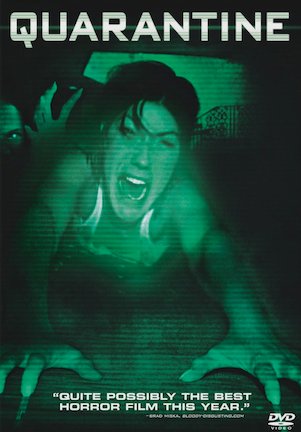Studio: Sony Pictures
Director: John Erick Dowdle
Writer: John Erick Dowdle, Drew Dowdle
Producer: Doug Davison, Roy Lee, Sergio Aguero
Stars: Jennifer Carpenter, Jay Hernandez, Columbus Short, Greg Germann, Steve Harris, Dania Ramirez, Doug Jones, Denis O’Hare, Bernard White, Rade Serbedzija, Johnathon Schaech
Review Score:
Summary:
When a deadly outbreak forces an apartment building into quarantine, the people trapped inside fight to escape as infected residents attack.
Review:
If a filmmaker remakes a movie scene-for-scene, can a film critic reuse his/her original review word-for-word? That question will have to remain hypothetical for the moment, as copying a review of the 2007 Spanish film [REC] (review here) and using it for the 2008 American remake “Quarantine” would be wrong for reasons other than self-plagiarism. “Quarantine” mirrors the story and format of [REC] while injecting its own moments of well-executed “found footage” horror, but it falls short of duplicating the same overall level of exceptional appeal that [REC] achieved.
Even with a release date of less than one year after [REC]’s debut, the existence of “Quarantine” is more defensible as a slavishly faithful remake than say Gus Van Sant’s widely derided “Psycho.” Subtitles are still a barrier limiting a movie’s potential reach in cinemas and in home video. Rewriting Jaume Balaguero and Paco Plaza’s Spanish film in English and recasting the actors with familiar faces makes sense for attracting a new audience less willing to try the idea under its previous presentation.
Though that latter goal collides head-on with the premise when recognizable small-screen stars immediately shatter any illusion of the movie being genuine “found footage.” Excluding those who truly believed “The Blair Witch Project” backstory, of course the audience knows that “found footage” is fiction and not snuff footage of real people murdered by paranormal activity. But the ability to buy into a movie’s fantasy is better enabled when actors are unknowns, triggering a sand grain in the subconscious that what is being viewed could conceivably be genuine.
When characters in “Quarantine” are portrayed by Jennifer Carpenter of “Dexter,” Greg Germann of “Ally McBeal,” and Steve Harris of “The Practice,” the conceit of authenticity has zero chance of leaving the ground. Favoring a cast comprised of name talent from popular television shows suggests either an unjustified overconfidence to sell the “true story” frame even with an obvious fiction betrayal, or outright abandonment of pulling off the format convincingly in the first place. Either way, the choice is more peculiar in instances such as Steve Harris’ inclusion. As the cameraman recording the footage, Harris is unseen for the majority of the film. His face appears onscreen for less than a minute in total, begging the question of why use an Emmy-nominated actor in the role at all.
More boggling than Harris’ role as the cameraman is how his character ever landed a job as a videographer. It makes sense for footage to be shaky, blurry, and otherwise unusable when inexperienced amateurs are at the helm with a camcorder as part of the story. Here, Harris’ cameraman is a seasoned Electronic News Gathering professional who operates a handheld camera for a living, yet he cannot hold the blasted thing steady to save his life. Nor can he center the action for longer than a half moment, exhibiting rookie behavior like whiplash zooming in and out during talking head segments. “Quarantine” tries hard to sell its “found footage” presentation, but does so at the expense of compromising its premise.
What “Quarantine” adds to or changes from the original screenplay is hit or miss. Despite being a mostly carbon copy, “Quarantine” adds 15 minutes of runtime that [REC] did not have. Some of that includes new jump scares and an added development regarding a police coverup of the building evacuation. It adds an interesting extra layer to the subplot although another is taken away by a change to the finale that leaves the outbreak’s origin muddied. Some had issues with [REC]’s explanation for events, but doing away with those details may leave new viewers frustrated at the ambiguous resolution.
As much focus as this review has put on what “Quarantine” fumbles, that is mainly in light of the film having the difficult challenge of living up to a contemporary classic. Without [REC] to compare it to, “Quarantine” would stand on its own as entertaining claustrophobic terror, and it works as such for those whose only exposure is to this version. Even though the movie can be recommended in that light, it still begs for an editing tune-up to give it the snappier stride its predecessor had. But unless an aversion to subtitles is really that strong, there really is no compelling reason to see “Quarantine” instead of [REC].
Review Score: 75







For veteran viewers, if not for the film’s makers, “Rosario” doesn’t include many memorable moments worthy of earning much enthusiasm.